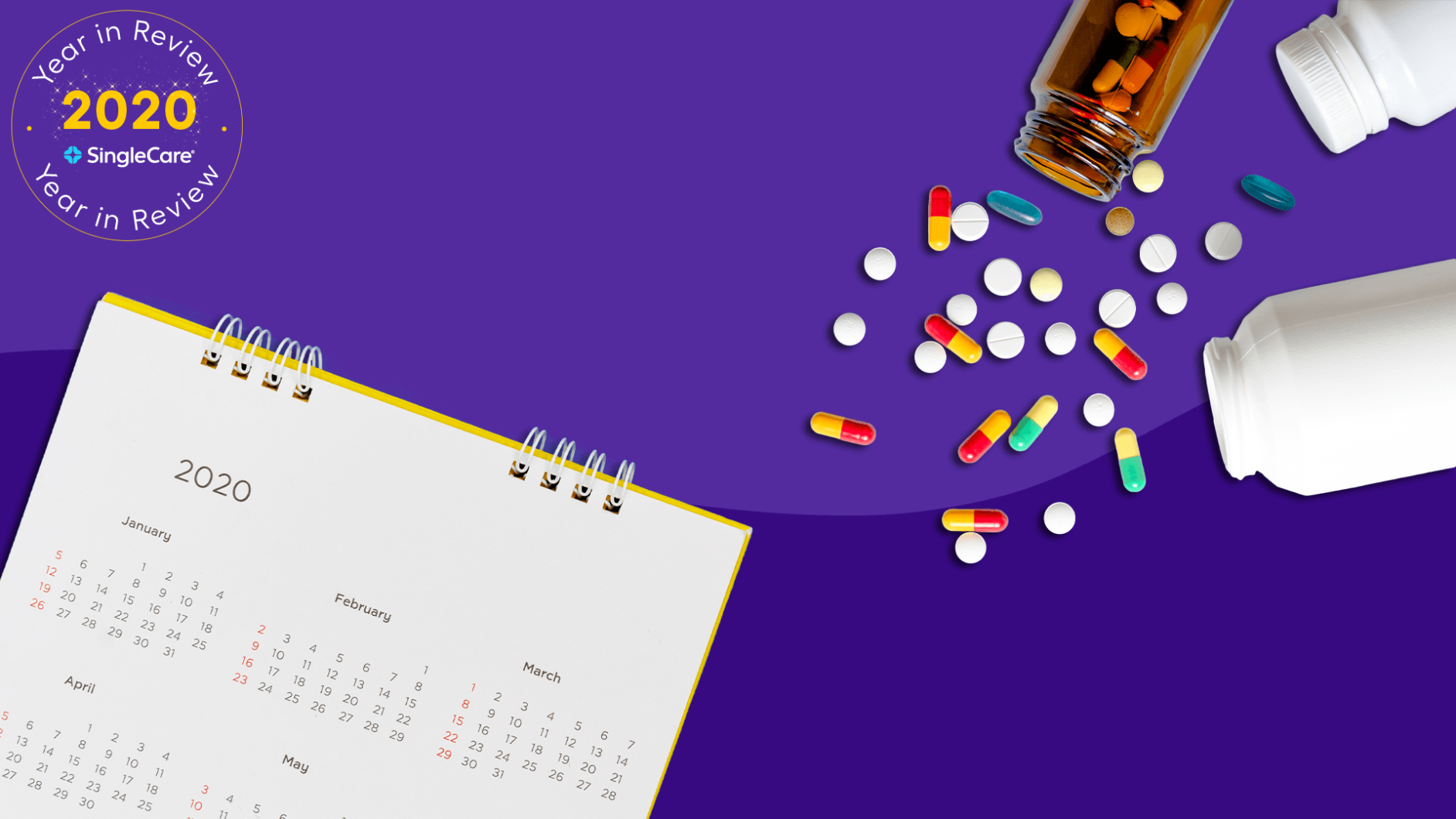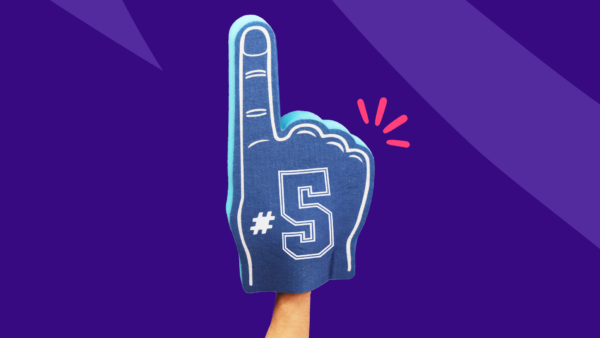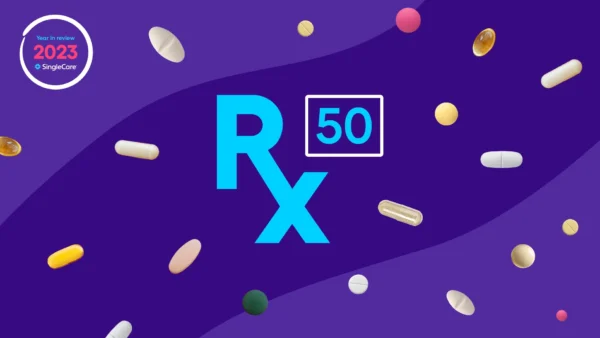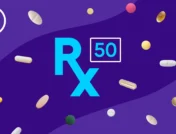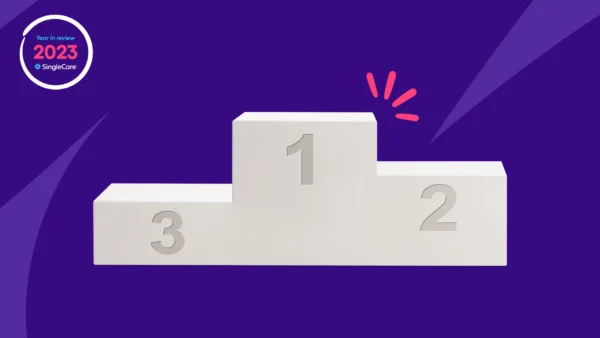Every year, SingleCare card users save thousands of dollars on their prescriptions. And some prescriptions are far more common than others. The 50 most commonly filled prescriptions this year range from tried-and-true anti-inflammatory medications like ibuprofen to established drugs like azithromycin (generic Z-pak) that saw experimental use to battle COVID-19.
The most prescribed drugs of 2020*
Here are the most prescribed drugs of 2020 among SingleCare users:
| Top drug | Brand name | What it’s used for | How to save |
| Amoxicillin 500 mg | Amoxil, Trimox | Bacterial infections | Get coupon |
| Vitamin D 50,000 IU | Drisdol | Hypoparathyroidism, osteomalacia, vitamin D deficiency | Get coupon |
| Ibuprofen 800 mg | Motrin | Pain, inflammation | Get coupon |
| Cetirizine hydrochloride 10 mg | Zyrtec | Allergy symptoms | Get coupon |
| Azithromycin 250 mg | Zithromax | Bacterial infections | Get coupon |
| Amlodipine besylate 10 mg | Norvasc | Chest pain, high blood pressure | Get coupon |
| Albuterol sulfate HFA 90 mcg/act | Proventil HFA, Proair HFA, Ventolin HFA | Wheezing, shortness of breath caused by breathing problems | Get coupon |
| Cyclobenzaprine hydrochloride 10 mg | Flexeril | Muscle spasms | Get coupon |
| Cephalexin 500 mg | Keflex | Bacterial infections | Get coupon |
| Hydrochlorothiazide 25 mg | Microzide | High blood pressure | Get coupon |
See the most prescribed drugs of 2019 here.
1. Amoxicillin 500 mg
Amoxicillin, a penicillin antibiotic, topped the list as the most common prescription filled by SingleCard card users in 2020. This powerhouse drug is used to treat a host of common bacterial infections like pneumonia, tonsillitis, and ear, nose, throat, skin, or urinary tract infections.
“It is also used for H. Pylori infection in combination with clarithromycin,” says Inna Lukyanovsky, Pharm.D., a New Jersey-based expert in gut and hormone health. H. Pylori is a bacterial infection in the stomach. In other words, its popularity is no surprise, based on sheerly the number of ailments it can cure.
See your doctor for a proper diagnosis. A viral infection won’t respond to amoxicillin, but a bacterial one will—and only your healthcare provider can know the difference. Avoiding unnecessary antibiotics can help avoid antibiotic resistance.“We’re finding more and more resistance with amoxicillin these days,” Dr. Lukyanovsky says.
2. Vitamin D 50,000 IU
Vitamin D has long been known to boost the ability of our immune systems to resist bacteria and viruses—a fact that may have led to an increased use of it in 2020. People get vitamin D through sun exposure, food, and/or supplements. However, more than 40% of Americans are estimated to have a vitamin D deficiency.
While many people take over-the-counter vitamin D supplements, some people are prescribed higher doses for “hypoparathyroidism, a condition that causes calcium deficiency, weakness, fatigue and muscle cramp and spasms,” Dr. Luykanovsky says. “It’s also prescribed for osteomalacia, a condition where there’s depletion of calcium from the bone.”
Vitamin D is also useful in treating inflammatory diseases like Crohn’s and Celiac. “You should have your vitamin D level tested regularly, especially if you have a chronic condition,” she explains.
3. Ibuprofen 800 mg
Well-known by its brand names, like Motrin, ibuprofen is a non-steroidal anti-inflammatory drug (NSAID) prescribed mainly to “decrease temperature and treat inflammation or pain and inflammation caused by many conditions such as arthritis, headache, toothache, back pain and more,” Dr. Luykanovsky says.
The difference between the over-the-counter version and the prescribed version is only in the dosage. OTC ibuprofen only goes up to 200 mg per tablet versus 800 mg for Rx strength. Most people have no issues with taking ibuprofen; the biggest complaint is typically an upset stomach. In rare cases, some people experience an ulcer, stomach bleeding, or a cardiovascular event after taking NSAIDs, but most people have no issues.
“Make sure you eat before taking ibuprofen,” Dr. Luykanovsky advises. Taking ibuprofen on a full stomach can decrease the likelihood of side effects. When taken correctly, it’s effective and has few side effects, making it a top choice for inflammation and pain relief.
4. Cetirizine hydrochloride 10 mg
More than 50 million people in the U.S. experience allergies every year, according to the Asthma and Allergy Foundation of America. Cetirizine hydrochloride is an antihistamine that’s mainly used to treat the symptoms that allergies cause like sneezing, coughing, watery eyes, and hives. It’s available over the counter, as well, but when you have an Rx you can take advantage of SingleCare savings.
RELATED: Can I use SingleCare for over-the-counter medications?
Many physicians recommend cetirizine over other allergy medications, like Benadryl, that can cause severe drowsiness. Just be sure to see how it affects you before driving or operating any heavy machinery. “It can impair your reactions and can cause sleepiness,” Dr. Luykanovsky explains. “And be careful if you add it on top of other drowsy medications.”
5. Azithromycin 250 mg
Azithromycin, an antibiotic commonly known as Z-pak, that treats respiratory and skin infections—and even some sexually transmitted diseases. The drug’s popularity in 2020 may be because “it made some noise this year being used during the first COVID-19 months as a combination or solo treatment for symptomatic patients,” Dr. Luykanovsky explains.
If you have a liver condition, it’s important to let your doctor know before taking azithromycin because in some rare cases it can cause liver damage.
6. Amlodipine besylate 10 mg
This calcium channel blocker is mostly prescribed for high blood pressure (hypertension), and works by relaxing and widening blood vessels. “Most people tolerate amlodipine with minimal side effects,” says Karen Kier, Ph.D., a professor of pharmacy practice at Raabe College of Pharmacy at Ohio Northern University. “It can also be used in combination with other drugs for high blood pressure to reach blood pressure goals.”
High blood pressure is very common in the United States, impacting about 45% of adults, according to the Centers for Disease Control and Prevention (CDC). Of those, about 51% take medication to treat their high blood pressure.
RELATED: Heart disease statistics
7. Albuterol sulfate HFA 90 mcg/act
With nearly 25 million adults and children with asthma in the U.S., it’s not a surprise that this medication is commonly prescribed. Albuterol sulfate is typically administered by inhaler and is meant to act quickly (it’s also referred to as a “rescue inhaler”) to help people with breathing problems like asthma and chronic obstructive pulmonary disease (COPD). “It works rapidly to open airways to improve breathing and reduce shortness of breath and wheezing,” Kier explains.
Inhalers for these conditions can be very expensive, but the FDA approved the first generic for Proventil HFA in 2020. Or, you can use a SingleCare coupon to reduce the price on either the brand or generic inhaler.
8. Cyclobenzaprine hydrochloride 10 mg
Cyclobenzaprine hydrochloride is a muscle relaxant used to control spasms. It’s been available for over 40 years in the United States. The drug is not meant to be used long-term, but is often prescribed for people who have back injuries or muscle strains and works best when combined with rest and/or physical therapy.
Cyclobenzaprine can cause some side effects like drowsiness, dry mouth, and dizziness.
9. Cephalexin 500 mg
Cephalexin is a cephalosporin antibiotic used for common outpatient bacterial infections like those in the lung, skin, ear, bone and urinary tract. When used to manage short-term infections, most people tolerate the drug well, Kier says. Like any other antibiotic, cephalexin doesn’t work on viral infections like the cold or flu.
10. Hydrochlorothiazide 25 mg
Hydrochlorothiazide is a diuretic, aka water pill, used to manage high blood pressure. The medication works by causing people who take it to urinate more often, which helps the body get rid of excess salt and water. Hydrochlorothiazide can also be used to treat edema (fluid retention) that can be caused by a number of medical problems including heart, liver and kidney disease.
Hydrochlorothiazide has been used for more than 40 years and is considered very safe. “This is an effective drug and it’s also considered a first-line medication for blood pressure by the American College of Cardiology national guidelines,” Kier says.
The 50 most prescribed drugs in 2020
Here are all the prescription medications that took top spots this year.
- Amoxicillin 500 mg
- Vitamin D 50000 IU
- Ibuprofen 800 mg
- Cetirizine hydrochloride 10 mg
- Azithromycin 250 mg
- Amlodipine besylate 10 mg
- Albuterol sulfate 108 mcg/act
- Cyclobenzaprine hydrochloride 10 mg
- Cephalexin 500 mg
- Hydrochlorothiazide 25 mg
- Lisinopril 20 mg
- Amphetamine/dextroamphetamine 20 mg
- Loratadine 10 mg
- Amoxicillin-clavulanate potassium 875-125 mg
- Folic acid 1 mg
- Prednisone 20 mg
- Benzonatate 100 mg
- Gabapentin 300 mg
- Zolpidem tartrate 10 mg
- Sulfamethoxazole/trimethoprim DS 800-160 mg
- Methylprednisolone dose pack 4 mg
- Fluconazole 150 mg
- Aspirin low dose 81 mg
- Atorvastatin calcium 40 mg
- Ferrous sulfate 325 mg
- Cyanocobalamin 1000 mcg/ml
- Metronidazole 500 mg
- Bromphen/pseudoephedrine HCl/dextromethorphan HBr 2-30-10 mg/5 ml
- Pantoprazole sodium 40 mg
- Vitamin D3 50000 IU
- Naproxen 500 mg
- Alprazolam 0.5 mg
- Oseltamivir phosphate 75 mg
- Nitrofurantoin monohydrate macrocrystals 100 mg
- Losartan potassium 100 mg
- Metoprolol succinate ER 25 mg
- Fluticasone propionate 50 mcg/act
- Chlorhexidine gluconate 0.12%
- Doxycycline hyclate 100 mg
- Metoprolol tartrate 25 mg
- Phenazopyridine HCl 200 mg
- Latanoprost eye drops 0.005%
- Sertraline HCl 50 mg
- Trazodone hydrochloride 50 mg
- Omeprazole 20 mg
- Ciprofloxacin hydrochloride 500 mg
- Levothyroxine sodium 50 mcg
- Meloxicam 15 mg
- Docusate sodium 100 mg
- Triamcinolone acetonide cream 0.1%
*Popular prescription drug information reflects the scripts most filled through SingleCare from Jan. 1, 2020 through Oct. 31, 2020, excluding opioids and weight-loss drugs.



